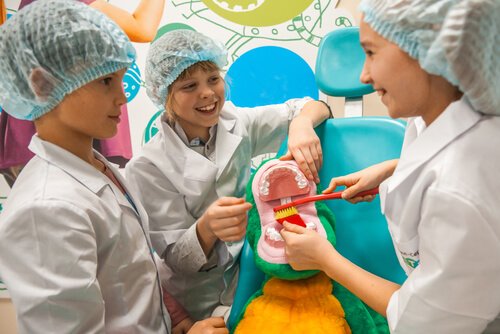How to Help Your Children Overcome Their Fear of the Dentist

These fears that develop or appear during childhood are the product of external agents or influences. They’re often the result of the attitudes and opinions of the adults in their lives.
In other words, fear of the dentist may arise because of the image that adults project. At the same time, it may simply be the result of a fear of the unknown.
In fact, the phobia of sitting in the dentist chair is a disorder recognized by the World Health Organization. According to the organization, less than 15% of the population suffers from this phobia.
Furthermore, the WHO indicates that the fear of the dentist is due in large part to bad experiences during childhood.
The Hebrew University of Jerusalem conducted a study regarding the issue of children and fear of the dentist. They focused their research specifically on the factors that influence the dental experience. To conduct their study, they monitored anxiety levels in children who went to have their teeth cleaned.
A portion of the children were received in a colorful environment with music and other details. The rest of the children were taken into a plain room without any special preparations. The study revealed that anxiety lasted only one and a half minutes in children who received their dental attention in the room with colors and music.

Suggestions on how to overcome a fear of the dentist
The development of this fear will depend a great deal on the dentist’s treatment of his or her young patients. Below we’ll provide you with some pointers on how to help your children overcome any fears they may have.
- Let your children know that everything’s going to be okay.
- Reward your child’s good behavior.
- Don’t use expressions that make your child think about negative things. For example, don’t say things like: They’re not going to hurt you. It won’t hurt. They’re not going to give you a shot, etc. These phrases only place these thoughts in your child’s head when, most likely, they wouldn’t have thought of them on their own.
- Choose a dentist that specializes in pediatric dentistry. That way, you know the environment will be more child-friendly and less frightening for little ones.
- Play dentist at home. Let your child pretend that he or she is the dentist while you’re the patient. Then switch around. Your child can also pretend to care for his or her stuffed animals. These role playing games allow children to take the situation more lightly.
- If your child has to go to the dentist and an older sibling has an appointment as well, have the older sibling go first. Meanwhile, have your younger child witness the appointment to see that nothing bad is going to happen.
How to handle your child’s first dental appointment
It’s important that children visit the dentist from around the time of their first birthday. At this point, a dentist can evaluate the presence of cavities and also observe if there are any issues with your little one’s bite. Starting a child’s dental history from such a young age puts you at a great advantage.
Parents should teach their children about the importance of dental hygiene and the habits they need to acquire.
It’s not enough for you just to brush your child’s teeth at home. You should also take your child to the dentist twice a year for professional supervision.
As parents, we must do our part in preventing the appearance of fears, or in making them worse. During your son or daughter’s first visit, do your best to communicate calm and confidence. Help your child feel comfortable and at ease with the dentist instead of creating fear.
Parental influence
In most cases, fear of the dentist is perfectly normal. This fear may be the result of a prior negative experience or simply a fear of the unknown.
However, it’s not good for children to be afraid of the dentist during their first visit. If they’ve never been to the dentist, then why should we let them be afraid?
Sometimes parents are inadvertently responsible for this fear. For example, many parents use the dentist as a threat. We say things like: “If you keep eating so many candies, you’re going to have to go to the dentist,” or “The dentist isn’t going to be very happy when she sees your teeth.”
When we say these things, we end up turning the dentist into a punishment.
Recommendations:
- Never use the dentist as a threat or a punishment, nor should you tell your child negative experiences in regards to dental visits.
- Don’t talk about the dentist using phrases that will only put your child on alert. For example, don’t say “He won’t hurt you.”
- Teach your child about dental hygiene from a young age, and include your dentist in the process.
- Help your child understand that going to the dentist is for his or her benefit.
These fears that develop or appear during childhood are the product of external agents or influences. They’re often the result of the attitudes and opinions of the adults in their lives.
In other words, fear of the dentist may arise because of the image that adults project. At the same time, it may simply be the result of a fear of the unknown.
In fact, the phobia of sitting in the dentist chair is a disorder recognized by the World Health Organization. According to the organization, less than 15% of the population suffers from this phobia.
Furthermore, the WHO indicates that the fear of the dentist is due in large part to bad experiences during childhood.
The Hebrew University of Jerusalem conducted a study regarding the issue of children and fear of the dentist. They focused their research specifically on the factors that influence the dental experience. To conduct their study, they monitored anxiety levels in children who went to have their teeth cleaned.
A portion of the children were received in a colorful environment with music and other details. The rest of the children were taken into a plain room without any special preparations. The study revealed that anxiety lasted only one and a half minutes in children who received their dental attention in the room with colors and music.

Suggestions on how to overcome a fear of the dentist
The development of this fear will depend a great deal on the dentist’s treatment of his or her young patients. Below we’ll provide you with some pointers on how to help your children overcome any fears they may have.
- Let your children know that everything’s going to be okay.
- Reward your child’s good behavior.
- Don’t use expressions that make your child think about negative things. For example, don’t say things like: They’re not going to hurt you. It won’t hurt. They’re not going to give you a shot, etc. These phrases only place these thoughts in your child’s head when, most likely, they wouldn’t have thought of them on their own.
- Choose a dentist that specializes in pediatric dentistry. That way, you know the environment will be more child-friendly and less frightening for little ones.
- Play dentist at home. Let your child pretend that he or she is the dentist while you’re the patient. Then switch around. Your child can also pretend to care for his or her stuffed animals. These role playing games allow children to take the situation more lightly.
- If your child has to go to the dentist and an older sibling has an appointment as well, have the older sibling go first. Meanwhile, have your younger child witness the appointment to see that nothing bad is going to happen.
How to handle your child’s first dental appointment
It’s important that children visit the dentist from around the time of their first birthday. At this point, a dentist can evaluate the presence of cavities and also observe if there are any issues with your little one’s bite. Starting a child’s dental history from such a young age puts you at a great advantage.
Parents should teach their children about the importance of dental hygiene and the habits they need to acquire.
It’s not enough for you just to brush your child’s teeth at home. You should also take your child to the dentist twice a year for professional supervision.
As parents, we must do our part in preventing the appearance of fears, or in making them worse. During your son or daughter’s first visit, do your best to communicate calm and confidence. Help your child feel comfortable and at ease with the dentist instead of creating fear.
Parental influence
In most cases, fear of the dentist is perfectly normal. This fear may be the result of a prior negative experience or simply a fear of the unknown.
However, it’s not good for children to be afraid of the dentist during their first visit. If they’ve never been to the dentist, then why should we let them be afraid?
Sometimes parents are inadvertently responsible for this fear. For example, many parents use the dentist as a threat. We say things like: “If you keep eating so many candies, you’re going to have to go to the dentist,” or “The dentist isn’t going to be very happy when she sees your teeth.”
When we say these things, we end up turning the dentist into a punishment.
Recommendations:
- Never use the dentist as a threat or a punishment, nor should you tell your child negative experiences in regards to dental visits.
- Don’t talk about the dentist using phrases that will only put your child on alert. For example, don’t say “He won’t hurt you.”
- Teach your child about dental hygiene from a young age, and include your dentist in the process.
- Help your child understand that going to the dentist is for his or her benefit.
All cited sources were thoroughly reviewed by our team to ensure their quality, reliability, currency, and validity. The bibliography of this article was considered reliable and of academic or scientific accuracy.
- Almenara, E. M. D., Galindo, L. S. M., & Veguilla, M. R. (2013). Miedo al dentista e intervenciones para reducirlo. Anuario de psicología clínica y de la salud= Annuary of Clinical and Health Psychology, (9), 53-55. https://dialnet.unirioja.es/servlet/articulo?codigo=4658022
- Lima Álvarez, M., & Casanova Rivero, Y. (2006). Miedo, ansiedad y fobia al tratamiento estomatológico. Humanidades Médicas, 6(1), 0-0. http://scielo.sld.cu/scielo.php?script=sci_arttext&pid=S1727-81202006000100007
- Rodríguez, J. M., Lizaranzu, M. C. N., Rodríguez, D. C., & Flores, J. G. (2004). ¿ Por qué se le tiene miedo al dentista?. Estudio descriptivo de la posición de los pacientes de la Sanidad Pública en relación a diferentes factores subyacentes a los miedos dentales. RCOE: Revista del Ilustre Consejo General de Colegios de Odontólogos y Estomatólogos de España, 9(2), 165-174. https://dialnet.unirioja.es/servlet/articulo?codigo=4539010
This text is provided for informational purposes only and does not replace consultation with a professional. If in doubt, consult your specialist.








